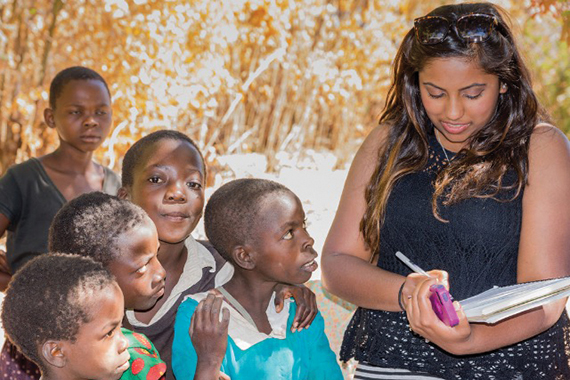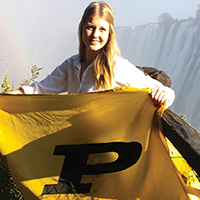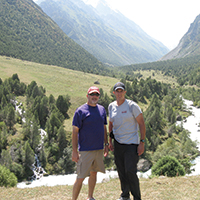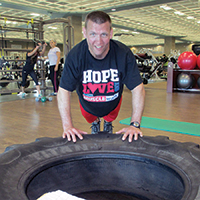 Oswin Chackochan (above right), a junior majoring in management and marketing, and Linnea Cline (below left), a junior management major, explored sustainable solutions to addressing world hunger through a summer internship sponsored by Land 'O Lakes. (Photo provided)
Oswin Chackochan (above right), a junior majoring in management and marketing, and Linnea Cline (below left), a junior management major, explored sustainable solutions to addressing world hunger through a summer internship sponsored by Land 'O Lakes. (Photo provided)
Hungry for Solutions
Fellowship feeds students’ passion for global entrepreneurship
Two Krannert undergraduate students took on a challenge of global proportions — how to feed an expanding world population — and traveled to Washington, D.C., and Africa this summer as part of a fellowship sponsored by Land O’ Lakes.
The yearlong fellowship required the students to explore sustainable solutions to world hunger. They each received a $1,000 stipend for their work during the school year and an 11-week paid summer internship that included two weeks in Africa.
 Linnea Cline (left), a junior majoring in management, says she was taken aback by the complexity of feeding 9.6 billion people globally by the year 2050. “In Africa we saw nutrition being compromised for filling foods. In Washington, D.C., we saw different perspectives of the economics behind global food security and perceptions of biotechnology taking place in Congress,” Cline says.
Linnea Cline (left), a junior majoring in management, says she was taken aback by the complexity of feeding 9.6 billion people globally by the year 2050. “In Africa we saw nutrition being compromised for filling foods. In Washington, D.C., we saw different perspectives of the economics behind global food security and perceptions of biotechnology taking place in Congress,” Cline says.
“And, in our rural co-op visits, we saw domestic hunger and the need for a solution for local food insecurity. There are so many things that need to be taken into account.”
Oswin Chackochan (above right), a junior majoring in management and marketing, says learning about the different agricultural practices in the U.S. and Africa was enlightening. “The highlight for me was to spend time and ask questions to real farmers in African villages,” she says. “It was inspiring to see the amount of change in one family’s life after one of the projects conducted by Land O’ Lakes. When entering these villages, the physical evidence of success was there. Families had better roofing and more small livestock.”
Families began to see the value in community effort. “They realized by sharing their resources and working together, each individual family would be more successful,” Chackochan says. “Organizations are trying to create partnerships with these individuals. Leaving the villages, I saw empowered entrepreneurs with hope and a vision for their future.”
Cline says, “I was able to see that education was the most valuable tool given to the small farmers in order to sustainably lift them from food insecurity, rather than immediate food aid. I can see the hope and potential for the countries we visited and am excited to see the role that Africa can play in solving the global food challenge.”
Chackochan is surprised the problem isn’t more widely known, although she admits that she was uninformed. “Before this internship, I knew that our population is increasing and that there are hungry people around the world, but I never knew the severity of the issue,” she says.
And after seeing the situation in Africa firsthand, she says, “It is impossible for one individual or one organization to come up with a solution to achieve global food security. We need every idea and every individual to work together toward a solution.”






